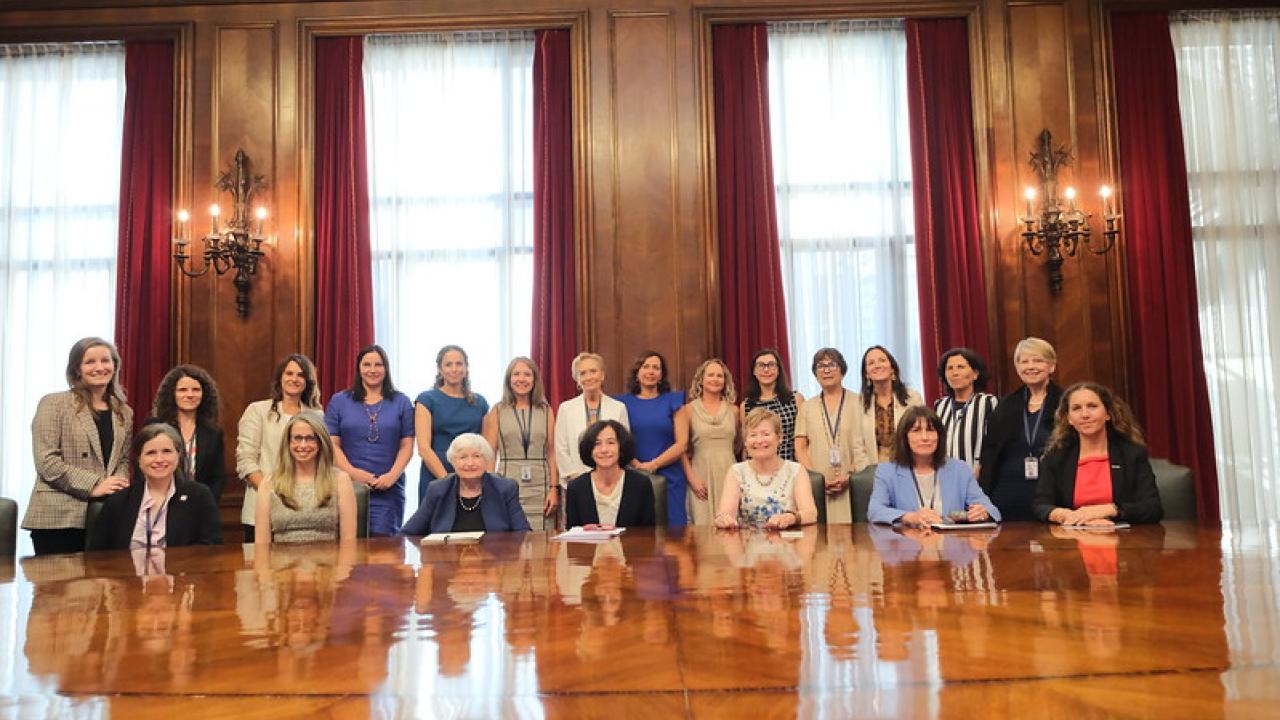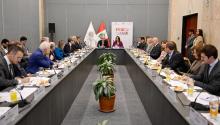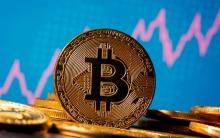
With the aim of marking ground in the commercialization of lithium and copper for decarbonization, the Secretary of the Treasury of the United States visits Chile. He has held meetings with the Treasury, President Boric, the American Chamber of Commerce, the Central Bank and this Saturday he will visit the facilities of the American lithium extractor Albemarle, in Antofagasta.
"We are going to go to La Moneda (the government palace in Chile), but the interesting thing will be at the Amcham event."
This is how a Chilean reporter with extensive economic experience summarizes the interest of the local media in the visit of the US Treasury Secretary, Janet Yellen.
Accompanied by a delegation of journalists from her ministry, American security agents and personnel from the United States embassy in Chile, led by Ambassador Bernadette Meehan, Yellen - who was the first woman to become Minister of the Treasury and President of the Federal Reserve - is at the center of attention of the Chilean economic sector.
This morning Yellen met with the Chilean Minister of Finance, Mario Marcel, where the topic of green energy and the energy transition took center stage.
“The United States is focused on deepening ties with trusted partners like Chile and building resilient and reliable clean energy supply chains through investments at home and abroad,” Yellen said at the conference alongside Mario Marcel.
Chile is a key producer of copper and lithium and the United States will seek to work as allies to address climate change and accelerate the energy transition.
At a roundtable on green energy, Yellen praised President Joe Biden's historic Inflation Reduction Act, or IRA. This law offers tax credits for electric vehicles, solar panels, and other renewable energy products made from metals mined in the United States or countries with free trade agreements with the United States, including Chile.
"That's why Yellen comes to Chile. She knows Marcel very well and is exploring which countries can enter into a partnership [with the United States] within the framework of this law, which is a bet by the Democrats," he said in the media La Second Oscar Vargas, from TKN SRL Asesores, who present themselves as lithium experts on their LinkedIn profile.
According to the Chilean Ministry of Finance, Yellen's decision reveals Chile's character as a strategic commercial partner for the North American country, which has been reflected through different agreements between both nations such as the Free Trade Agreement that this year fulfills. 21 years and which has allowed an increase in average annual trade exchange of 9.1% since 2003, while Chilean exports to that destination have reached an average annual increase of almost 7%.
U.S. trade in goods and services with Chile totaled an estimated $48.6 billion in 2022, with U.S. exports totaling $28.9 billion and imports totaling $19.7 billion.
Despite this, Chile's largest export market remains China, with 39.4%, followed by the United States with 13.9%, Japan with 7.6% and South Korea with 6.2%. %.
“We see opportunities to further integrate our supply chains with benefits for our economies,” the Treasury secretary said, adding that the possibilities for collaboration extended far beyond clean energy and included investment selection best practices.
According to Reuters , the visit is part of a broader push by the Biden administration to reduce its dependence on critical minerals from China and build more diversified and resilient supply chains.
It's what Yellen calls " friendshoring ," that is, a strategic approach to offshoring or outsourcing that prioritizes countries with which a company's home nation maintains friendly diplomatic, economic or trade relations.
Still, quoted by Reuters , the minister did not indicate any desire to disengage from China, despite concerns raised by the International Monetary Fund (IMF) and others about growing geoeconomic fragmentation.
FEMALE REPRESENTATIVENESS
After noon, Janet Yellen held a series of meetings at the Central Bank of Chile, both with its authorities and with a group of female leaders from the corporate, economic and financial spheres.
“The Central Bank of Chile is internationally recognized for its excellent conduct of monetary policy. "I am very grateful to be able to exchange views on the economic developments of both countries, which have a very strong collaboration in trade and investment based on strong shared values," said Yellen.
In both instances, the US authority addressed issues related to macroeconomics, inflation, employment and the evolution of international trade.
At the beginning of the meeting, the president of the Central Bank, Rossana Costa, stated that the objective was to exchange points of view on the economies of the United States and Chile, with a special focus on the issues of the economic cycle of both countries, activity, inflation, employment, financial markets, evolution of international trade and energy transition, among other matters.
For Costa, the interest of the meeting was based on Yellen's career as the first person to hold the positions of president of the White House Council of Advisors, president of the United States Federal Reserve and Secretary of the Treasury.
“At the Central Bank of Chile we firmly believe that we must work as a society for greater gender equality, promoting and enabling the access and professional development of women, as well as greater participation and permanence in the labor market,” said Rosanna Costa.
In the afternoon, Yellen will hold a meeting in La Moneda with the President of the Republic, Gabriel Boric, who will be accompanied by Minister Marcel, to culminate her first day with an activity organized by the Chilean North American Chamber of Commerce (AMCHAM).
Tomorrow, Saturday, Yellen and Marcel will visit the facilities of the American lithium production company Albemarle in Antofagasta, where they will also learn about the work of the startup accelerator Aster Accelerator in its space in the Huanchaca Ruins.
Why there?
"Albemarle, being North American and the second largest lithium producer in the world, is a pillar on which the United States will try to secure its lithium supply. Yellen [going] to Albemarle allows us to send a clear message to the Chilean authorities about the interest and need that the United States has for lithium," iLiMarkets managing partner Daniel Jiménez Schuster said in the evening newspaper La Segunda .
It should be noted that the Chilean government's agreement in 2030 to boost lithium extraction is between the state-owned Codelco and the Chilean SQM, and not with Albemarle. In any case, the American mining company has a contract with the government until 2042.
At the end of January, the firm laid off 4% of its workforce - about 300 people - due to the drop in the price of lithium. All in all, the contributions of SQM and Albemarle to the Chilean Treasury for taxes were US$3.1 billion until the third quarter of 2023.
UNITED STATES AND THE RESILIENT ECONOMY
Yellen's visit was a detour from the G20 meeting in Brazil, where on February 28 and 29, São Paulo hosted the Ministerial Meeting of the Finance Channel, under the coordination of the Minister of Finance, Fernando Haddad.
Part of that occurred on Thursday with a meeting with his Argentine counterpart, the Argentine Minister of Economy, Luis Caputo. At that rally, Yellen, who praised the current government's "important steps" to restore economic stability, stood on the sidelines of a G20 finance meeting in Sao Paulo.
The administration of Javier Milei, who took power in Argentina last December, "has inherited an arduous task of stabilization, but has already taken some important steps to restore fiscal sustainability, adjust the exchange rate and combat inflation," he said. Yellen at the beginning of the meeting with Caputo, the AFP news agency noted.
Also there, Yellen reinforced the support of the United States government in the Argentine "economic transition", also expressed by the US Secretary of State, Antony Blinken, during his visit this week to Argentina after participating in the G20 foreign ministers' meeting.
And the US debt has been criticized for months by orthodox economists. Bidenomics seems to have the most important country in the world with inflation that does not stop - hence the Fed has not yet lowered rates at the expected rate - high prices and oscillating unemployment.
Although there was talk of a recession or a soft landing of the economy, two recent data seem to prove Yellen's leadership right and close a positive week for the Democratic administration, which is up for re-election this year.
Just this week, Yellen said at the G20 that the global economy remains resilient and praised the United States as an engine of growth.
Strong U.S. economic growth has been a "key driver" of better-than-expected global growth, the Treasury secretary said. "Looking ahead, we remain aware of the risks facing the global outlook and continue to carefully monitor economic challenges in certain countries, but the global economy remains resilient," he said.
Last month, the IMF lowered its global growth outlook to 3.1% in 2024, two-tenths of a percentage point higher than its October forecast, and left its 2025 forecast unchanged at 3.2%.
Still, Yellen said U.S. economic strength had underpinned global growth, boosted by Biden administration policies supporting businesses hit hard by the COVID-19 pandemic and investments in domestic manufacturing, clean energy and infrastructure.
"If a U.S. recession had occurred in 2023, as many predicted, global growth would have been derailed. While there are risks to our outlook, U.S. growth has consistently exceeded projections," Yellen said.
On the other hand, this week the analysis firm Allianz GI points out that a "no landing" scenario in the United States is increasingly realistic, since it shows "surprisingly solid" growth.
In that sense, the study signed by the entity's investment strategist, Stefan Rondorf, said that, in mid-January, investors expected around six rate cuts of 25 basis points each, but now they anticipate only three: “ For now, money markets expect the Fed and the ECB to apply the first cuts in June,” noting that it is even possible that the ECB will lower rates before the Fed, which would favor the dollar.
While the analysis firm Julius Baer highlighted in a statement this day that the Personal Consumption Expenditure Index (PCE) of the United States confirmed that inflation is not decreasing.
“We still expect the Fed's preferred measure of inflation, the core PCE deflator , to slow to 2.2% on average in 2024, from 4.1% in 2023. Short-term fluctuations in inflation support our view. view that the Fed will cut interest rates very slowly, starting in May or June, and executing no more than three cuts. These cuts will be of little decisive and insufficient to reduce long-term bond yields. "Consequently, we revised upward our three-month forecast for 10-year US Treasury bond yields, to 4.2%," they indicated.
As a counterpoint, today the Treasury Department website contains an analysis arguing that the benefits of the Inflation Reduction Act are greater than published projections, while the economic costs are lower than the fiscal costs.
“The IRA will produce cumulative global economic benefits from reduced greenhouse gas pollution of more than $5 trillion from now to 2050 (…) it will also reduce local air pollution, providing domestic health and productivity gains.” To united states. “Lowest estimates of the benefits of those local pollution reductions range from $20 billion to $49 billion in 2030 alone, compared to climate benefits that year estimated at $137 billion,” the document states.








